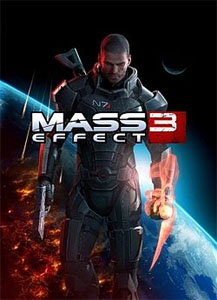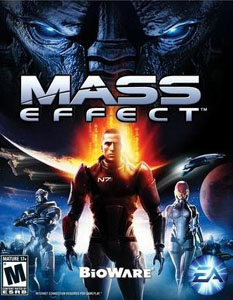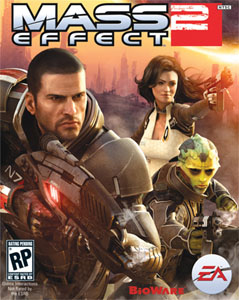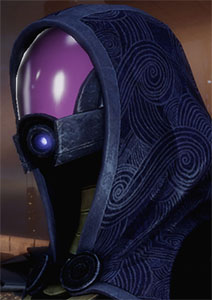 I spent most of my play-thru of Mass Effect 3 convinced that the people who were complaining about the ending were insane. This game was fantastic! And it wasn’t like the previous two games hadn’t funneled me down to a flavored variations of the same basic structure.
I spent most of my play-thru of Mass Effect 3 convinced that the people who were complaining about the ending were insane. This game was fantastic! And it wasn’t like the previous two games hadn’t funneled me down to a flavored variations of the same basic structure.
… So, yeah. I was wrong. That ending really was just as bad as everyone was saying.
At this point, the failed ending of Mass Effect 3 is a well warmed chestnut. Because of that, in my discussion here, I’m going to try to avoid dwelling too much on specifics. But I do want to spend a little time discussing the structural flaws of the ending and what can be learned from those.
(Although I won’t be delving deeply into specifics, there are still MASSIVE SPOILERS ahead.)
NEGATING CHOICE
Most of Mass Effect 3 is an amazing conclusion to a series in which tough choices had real consequences. As Mass Effect 3 develops, those choices begin to reshape the galaxy itself. It’s incredibly powerful watching this saga draw itself towards a conclusion: Old favors are called in. Old debts are paid. Old vendettas are fulfilled. Entire races are set in motion or destroyed based on the actions you’ve taken.
Wow.
Regardless of which path you take, however, there is a pervasive theme of “bringing the galaxy together”. It is a massive, seemingly impossible task. But slowly and inexorably you manage to pull it off. (And, unlike a lot of RPGs, it never feels like a deus ex machine or shortcut or a cheat. You have to work at it and it’s believable when the pieces start coming together.)
Unfortunately, the three endings presented to you at the end of the trilogy render most (or all) of your choices irrelevant.
Most pervasively, of course, the destruction of the mass relays renders the entire theme of “bringing the galaxy together” irrelevant. But the problems pervade at every level of the game.
Did you cure the genophage or leave the krogan sterile? Doesn’t matter. Either their entire genetic code has been rewritten or they’ve been isolated on a world that the writers went out of their way to tell you can’t support them.
Did you kill the quarians? Kill the geth? Unite them in peace? Doesn’t matter. Either you killed all the geth or rewrote both species into cyborgs.
And so forth.
I talked just a couple days ago about the series’ penchant for negating tough choices, but negating these choices on this scale is practically criminal. This alone would have guaranteed fan outrage: You can’t invest players fully in making meaningful choices and then take it all away from them in the last two minutes.
THEMATIC INCOHERENCE
For most players, the ending of Mass Effect 3 negates important themes and accomplishments that were seen as integral to the story of the series.
For example, in my play-thru – between curing the genophage and forging a lasting peace between the quarians and geths – I had emphasized (a) that wiping out an entire species was wrong; (b) free will was incredibly important; and (c) organics and synthetics could work together.
Then, at the end of the game, I was given a choice between (a) wiping out the species I had just saved; (b) taking away free will from the Reapers; or (c) forcing everyone in the galaxy into becoming something they aren’t without their permission or consent. And I’m not even allowed to use my experience with the quarians and geth to argue with the smarmy, mass-murdering AI boy that there’s a non-genocidal solution to the “created vs. creator” problem.
The synthetic destruction ending just rubs your nose in it when you realize that Joker is desperately trying to save the love of his life by outrunning the energy wave… and then he fails and we watch him walk out of her corpse while the soundtrack shifts into an uplifting tune (pun intended). Holy shit, Bioware.
This failure can be a little bit harder to pin down because these thematic elements can vary radically over the course of the three games depending on the choices you made. I think there actually is a narrow range of play-thrus in which you exterminate the geth and treat EDI like a slave in which the “destroy the Reapers” ending is thematically consistent.
But most players experienced this thematic incoherence, and it severely disrupted their connection to the game.
(For a deep exploration of this thematic incoherence, check out the excellent original post in this thread.)
Worse yet, this particular thematic incoherence was achieved by forcing the players to make a choice which would be fundamentally out of character for most of them. This is a mistake a lot of games make, but it was particularly devastating in a game like Mass Effect which had spent 90+ hours avoiding the exact mistake.
(A related problem in many games is that “cut-scene boss fight” where you’re suddenly forced to lose. This was something else that the Mass Effect series had avoided until Mass Effect 3 introduced Kai Leng. As with forcing an out of character choice, this abrupt deprotagonization alienates the player from their character.)
CONTINUITY ERRORS
The ending further complicates those two major problems by including an incredibly large number of gaping plot holes.
I don’t agree with those that claim that the destruction of the mass relays must inevitably signal a mass extinction event: The release of the energy in most endings is clearly shown to be non-destructive (either transforming everything or destroying only Reapers) and is quite clearly different from the uncontrolled explosion you get from plowing a meteor into a mass relay.
But, for example, how did everyone get back onto the Normandy?
Which brings us to the final structural flaw: You can get away with enigmatic endings to a 2-hour sci-fi art film, but people are going to have a lot less patience for that after 90 hours of investment. Particularly if the primary experience of the game is explicitly seeing the consequences of your actions.
BLATANT LYING TO YOUR CUSTOMERS
The designers of the game promised that the ending would definitely not be “choose A, B, or C”.
The actual ending, of course, is literally someone telling you to choose A, B, or C.
Don’t lie to your customers. That never ends well.
FINAL THOUGHTS
There are a lot of ways in which the ending of Mass Effect 3 could be “fixed”. Most of them have already been bandied about.
From a structural standpoint, however, it’s interesting to note that the game would have been more successful just having a single ending with no choice at all: Shepard reaches the Citadel, activates the Crucible, and wipes out the Reapers (while either living or dying in the process).
This ending would have worked because it would have actually provided a functional tabula rasa at that point: The entirety of the game had reshaped the galaxy (in many different ways) towards the singular goal of wiping out the Reapers. Achieving that goal would provide clear satisfaction regardless of the path that had been previously charted, and the player would have been free to read the future fate of the galaxy based on their experiences up to that point.
Effectively, this lack of choice in the final two minutes of the game would actually turn the entirety of Mass Effect 3 into the ending of the game.
(If you wanted to further improve this ending, you could simply add explicit detail about the future fate of characters and civilizations based on the play-thru. If you wanted to be really awesome about it, more of your choices would have also been reflected in the final battle for Earth. But these wouldn’t be strictly necessary to improve upon the fundamentally unsound ending provided in the game as it was published.)
Of course, there are also a number of other “three choice endings” that could have been applied without implementing something structurally unsound. Maybe you force a choice between different ways of destroying the Reapers with different consequences for each (destroy all synthetic life; destroy the mass relays; destroy Earth). Maybe you give the same three basic choices (control, destroy, synthesize) but in a way which is thematically consistent with the rest of the game and built on the choices you made instead of negating them. Each of these would be a tough choice with meaningful consequences, but they would not have negated your previous choices or been thematically incoherent.
So, yeah. Lots of ways it could be fixed. But the same could be said of the Star Wars prequels.
Screw it. My game ended with a beautiful sequence in which Shepard destroys the Reapers while in no way murdering EDI and mass-murdering a race that I had just spent the last 20 hours trying to save while reconciling them with their creators.
Also, there was no Highlander 2.














